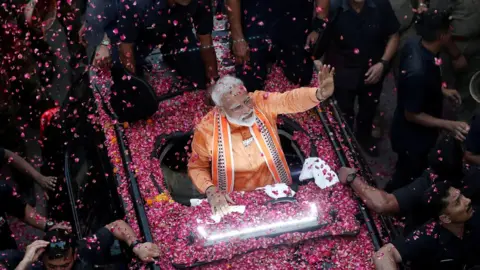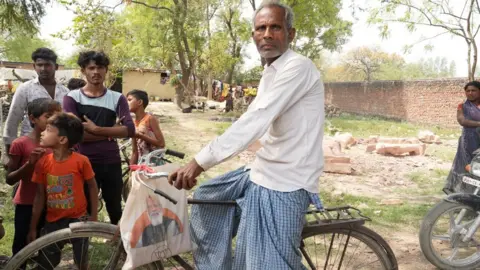Narendra Modi’s India: A decade of popularity and polarisation
 Reuters
ReutersTen years after becoming prime minister, Narendra Modi is aiming for a historic third term - what makes him India's most prominent leader in decades?
Many voters feel things have got better since he took office in 2014, but will people who are struggling back him in the country's general election?
In Mr Modi's constituency in the northern city of Varanasi, saree weaver Shiv Johri Patel says he's got many worries - but he's clear who's getting his vote.
"Mr Modi has done great work. We haven't seen poor people getting so many welfare benefits under any other government," he says.
Mr Patel says his sons can't find jobs and local middlemen have cheated him out of a federal government welfare payment - but he doesn't blame the prime minister.
"It doesn't matter if I get what I'm owed or not, I will still vote for him," he told the BBC.
Varanasi goes to the polls in the last round of voting before results day on 4 June.
 BBC
BBCAt 73, Mr Modi remains a massively popular yet polarising figure, both in India and abroad.
Supporters claim he is a strong, efficient leader who has delivered on promises. Critics allege his government has weakened federal institutions; cracked down on dissent and press freedom; and that India's Muslim minority feels threatened under his rule.
"Mr Modi has very staunch admirers and very strong critics. Either you like him or you dislike him," says political analyst Ravindra Reshme.
Opinion polls have put Mr Modi comfortably ahead of rivals and his party is widely expected to form India's next government. (Caveat: polls have been wrong before and voters can deliver unpleasant surprises - even for popular leaders).
He has set a tough target for his Bharatiya Janata Party (BJP) - winning 370 seats out of 543 in parliament, up significantly from 303 in 2019. This would mean not just retaining northern states the party swept last time but also gaining in traditionally tougher states for the BJP in the south.


Comments